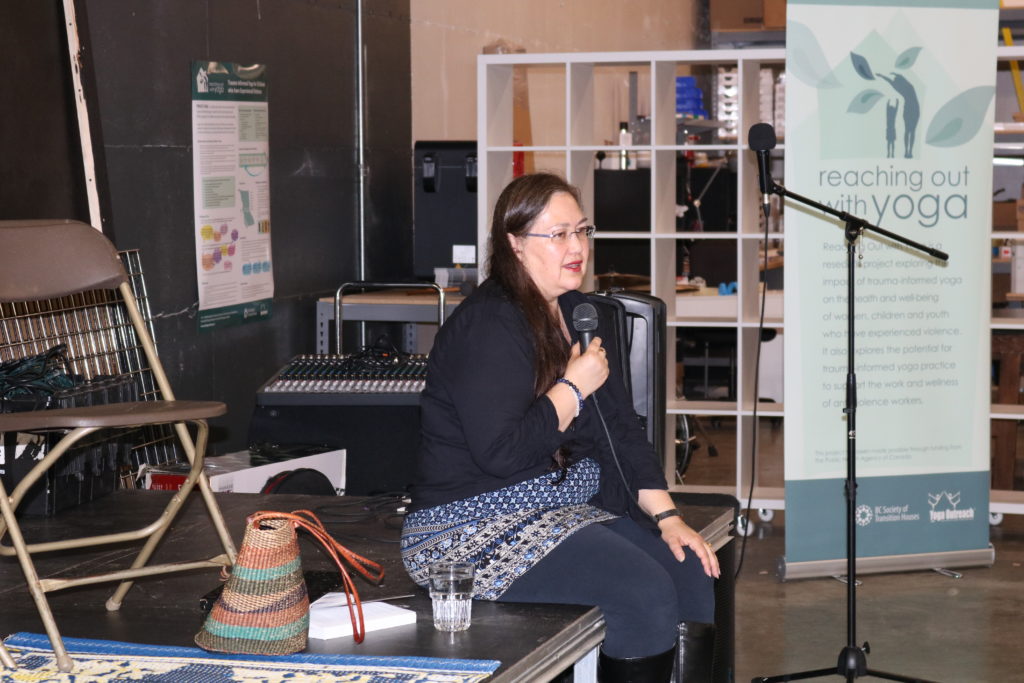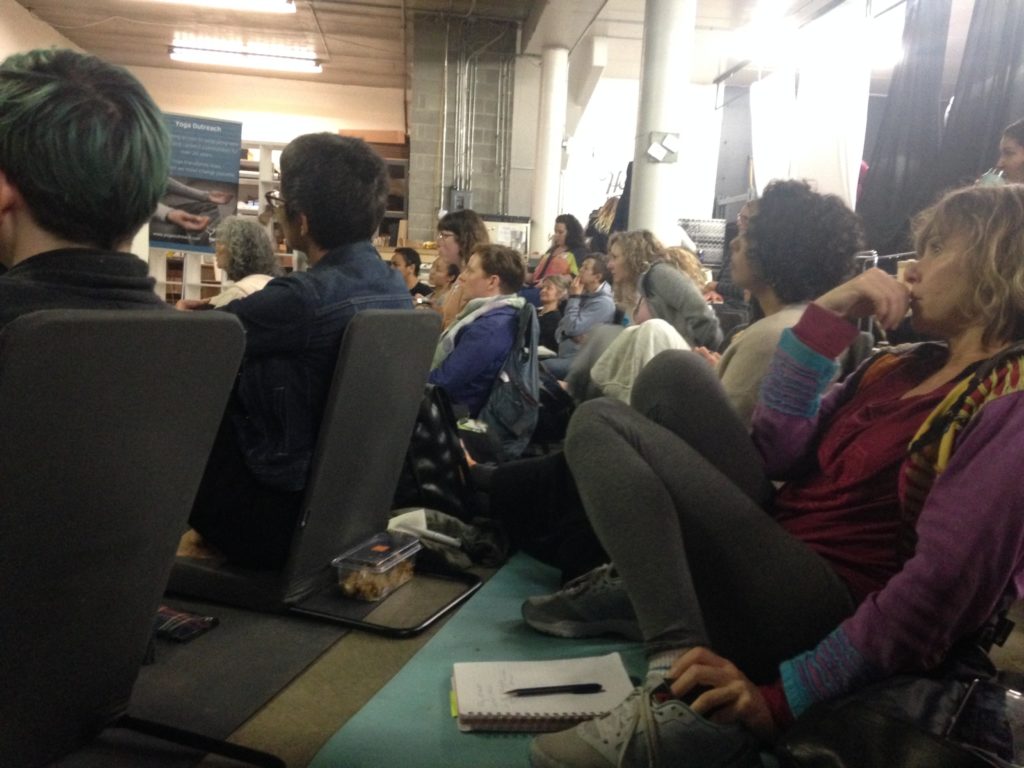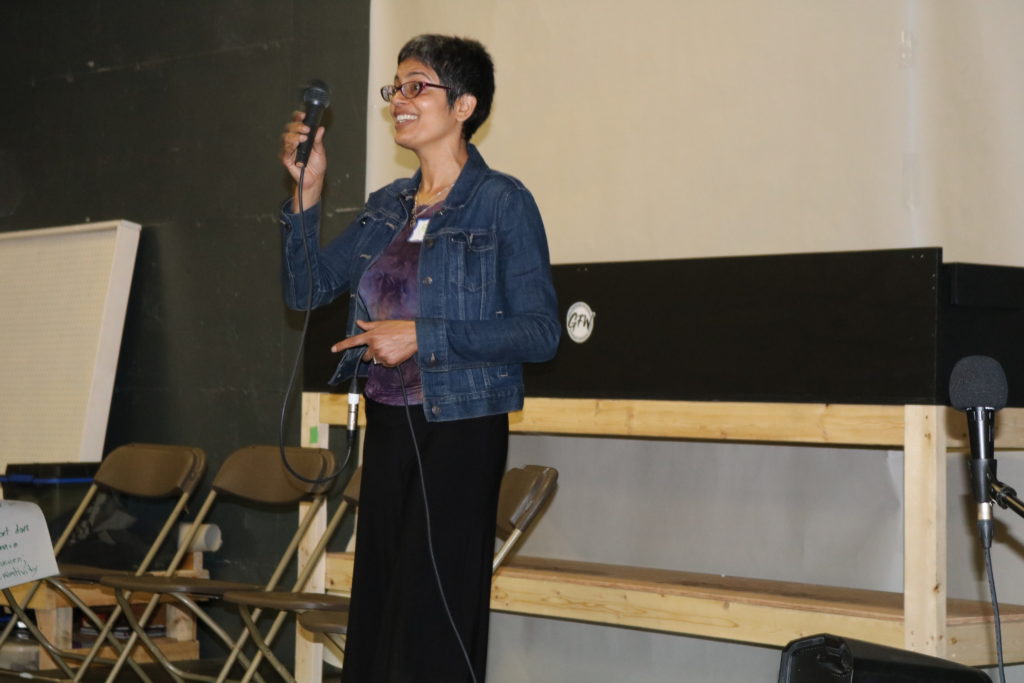why host a conference about bad stuff?
On May 25, Yoga Outreach hosted its first ever conference: Exploring Boundaries, Building Bridges: Connecting Yoga, community, and self.
We started by booking Matthew Remski, who had recently published a book about the aftermath of sexual abuse revelations in a well-known yoga community. While planning this author visit, we realized that there was even more to talk about. In the case of Pattabhi Jois, victims were fearful of coming forward against this popular important leader, and communities around the world reacted with complete denial, vicious anger, or suggestions that victims simply didn’t “get” what Pattabhi Jois was about.
We realized that many yoga communities – including Vancouver’s – struggle to talk about harm or injustice openly. This extends beyond sexual abuse to inappropriate boundary setting, racism, ableism, fat-shaming, or public scoldings for failing to follow instructions. Being able to offer critique – and take it – is essential for preventing those kinds of downward spirals where everyone is afraid to speak out because nobody else seems to have a problem.
Never host just ONE Yoga conference
At times, planning this conference was incredibly stressful and, on occasion, demoralizing. Other moments were filled the ecstatic pleasure of seeing an event we’d talked about for so long in the flesh! (A bit like childbirth. In fact, we’re already talking about a sibling)
- We wanted so much to create a venue for talking about the shadow side of yoga and yoga culture; Yay us! And yay to everyone who came and shared!
“The whole workshop brought me so much clarity and perception to apply personally and in my professional life.”
- And also, as an organization we are keenly aware of our shortcomings, the most visible of which is our whiteness. While we have some pretty great relationships with board members, YO volunteers, and other brilliant BIPOC in our community, these connections weren’t enough to secure more than 25 percent BIPOC on stage.
Still, we chose to take a collective breath and forge ahead. Better to talk about privilege, self-care, and sexual abuse with a mostly-white, mostly switched-on crowd than to hide our blushing faces and not talk at all.
Goals for our next Yoga Conference
…. that Boundaries and Bridges is our FIRST conference.
… that our shortcomings and mistakes are not excuses to quit, but calls for more strategic, more connected ACTION.
… that worrying about impacts and outcomes is a sign our work is meaningful to us.
Favourites from our first Yoga conference:


I loved having an opportunity to connect with other yoga teachers in this way. It was incredibly restorative.

“I loved the experiential nature of Farrah’s workshop.”

We also learned from keynote speaker Matthew Remski that the list of yoga houses with unresolved sexual abuse issues is unbelievably long, and comprised of well-known names and lineages. Nearly everyone attending had probably studied with someone that traces their teaching lineage back to a group on that list. Several people asked, during question periods, how they should address this harm on resumes or in bios.
Remski also explained that whether or not your vulnerable self ends up in a cult is largely dependent on good, mediocre, or terrible luck. (Apply this wisdom to toxic relationships too. )
“I was so impressed and inspired by Matthew Remski, his talk, and the PRISM model. I appreciated the transparency and integrity with which he spoke and the empowering and practical steps he offered to all those who are connected to Lineage teachings which are affected by criminal allegations.”

Learnings about how to host a Yoga Conference:
- More movement. At the next conference, a mini-yoga practice after every long-ish listening session. A longer, embodied social justice practice. What would that feel/look like?
“Mathew’s talk was very compelling and it was also quite heavy. I think in planning next year’s event, include the heavy stuff, but place it in the middle of the day. Or offer an grounding/centering exercise to end the day – this would have been helpful for me.”
- Diversity, diversity, diversity. More BIPOC folks, more people sharing LGTBQ2SIA+ experiences, and people with varying educational backgrounds – from academic to hard-earned street smarts or lived experience. To do this, everyone within our organization needs to start networking with everyone they know way sooner. Visually, there are fewer BIPOC in the Lower Mainland yoga community than white people. And even fewer POC who love public speaking about yoga AND social justice AND who were available on the exact day we’de already booked our keynote speaker. Lesson – start earlier, widen our search, expand our relationships, trust the hive-mind more.
“How do you keep the doors open to conversations about race, inclusion, diversity and be one of the few or only BIPOCs in the room , particularly as a paying learner. As everyone holds room for individuals to be where they are in the conversations. Who holds the BIPOC? Where do they unpack? How do faculty support the students in this conversation and recognize that there is a power imbalance within the learning environment and care for the BIPOC who are at risk of harm? It’s a topic that I think is important in regards to Vancouver especially since being the only ”othered” is very often the case in a yoga school or space. It’s just if we are promoting more want for diversity and inclusion then there needs to be systems in place to actually support it.”
- More attendee participation. That might look like more time for question periods after the panel discussions. Or it might be breaking out in smaller groups to brainstorm even better solutions than those of presenters.
“a bit more time for q+a would have been nice, especially since it was a smaller group, so nice intimate experience to ask questions/have dialogue”
- Schedule a conference for Fall or a different month than Yoga Outreach’s big Retreat and flurry of spring workshops. Less exhaustion for staff, and less demands on our supporters’ personal resources with so many events in a short period.
- Include more of our key supporters in the planning stage. We heard a lot of great ideas in the feedback and we know folks have close contacts with amazing facilitators and compelling keynote speakers. Together, we can curate an amazing line-up of voices for next year!
“I do feel there could be more variety on stage. I don’t just mean in colour but also in “formal education “. I often think about how to help others when the “othered” isn’t represented.”
Do you have ideas about how to host a Yoga conference?
Are you still mulling over something said or not said at the conference? Got suggestions for a future gathering? Let us know, either in comments below, or by emailing info@yogaoutreach.com
You might also enjoy our conversations with other presenters at the Boundaries and Bridges conference, held May 2019 in Vancouver:
Julie Peters on survival self-care
Farah Nazarali on setting boundaries
Matthew Remski on preventing cult dynamics in yoga culture
Insiya Rasiwala-Finn on how mainstream self-care differs from Ayurvedic self-care
Liana Yip on why avoiding the shadow side makes people and communities vulnerable
